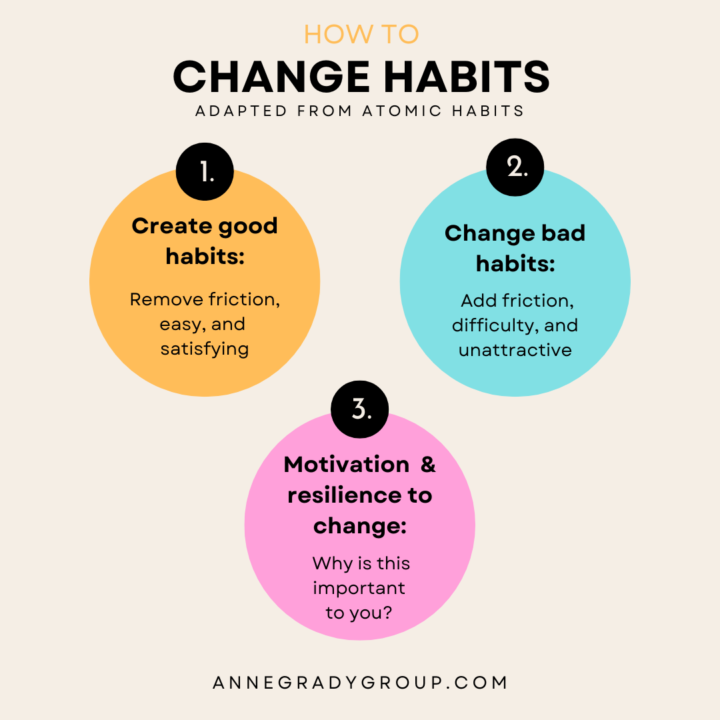Behave your way to better
Behave your way to better
Behave your way to better
Are you a resolution maker?
At one point or another, most of us have set New Year’s resolutions. We’ve made the decision to eat better, get healthy, and go to the gym, but by February, we’ve got a beer in one hand and a cheeseburger in the other. We went to the gym and that hurt — not doing that again! We try to make drastic changes, only to end up making no change at all. Why? Because changing habits happens one of three ways: Slowly, rarely, or never.
Your habits are nothing more than cognitive shortcuts, allowing you to conserve mental energy. After all, if you had to think really hard about putting on shoes, eating, taking a shower, or getting dressed, you would be exhausted by 9:00 AM. Your brain conserves energy by taking anything you repeatedly think, say, or do, and turning it into a habit.
Try something. Cross your arms.
Now cross them in the opposite direction. The second time probably felt more clunky and awkward, and that’s because it happened from a different part of your brain than the first. The first was a habit, the second required a little thought.
Think of your brain like a field full of grass. You can walk through the field, but the grass will still pop back up. You may have to walk the exact same path a hundred times before a pathway is carved. And just because you carve new pathways doesn’t mean the old ones aren’t still well-worn and comfortable. Old bumpy paths that we know can be more comfortable than the smooth ones we don’t.
Your neural pathways have been deeply carved, and it takes repetitive, consistent change to build new ones. And just because you develop a new neural pathway does not mean old ones are erased—which means it’s easy to slip back into old habit patterns.
Unfortunately, your brain doesn’t know the difference between the habits that help you or those that undermine your success and happiness. Building your resilience buffer zone requires that you be deliberate about cultivating the habits that will lead to the life you want. Rather than inspiration or motivation, you have to behave your way to better.
Recipe #3: Cultivate habits that build your resilience buffer zone.
How to practice: Create two lists. For the first list, identify the habits that support the life you want. On the second list, identify the habits that get in your way. Here are a few of my examples.
Daily Habits That Support Me:
– Practice gratitude while brushing my teeth.
– Take 30 minutes to wake up without news, social media, or email.
– Exercise 3-4 days a week.
Daily Habits That Sabotage Me:
– Ruminating about the past.
– Checking email after work hours.
– Eating unhealthy snacks.
As you go through your day and week, keep a collection of these habits. Rather than try to change everything at once, choose one of these two options:
1. Pick one habit that is helping you. How can you incorporate more of it into your daily routine?
2. Pick one habit that is sabotaging you. How can you do less of it or create friction to make it harder to do?
Rather than making a drastic change, this allows you to make subtle changes and experience small wins. When you stop to acknowledge the “wins”, you get a surge of dopamine, giving you the energy and motivation to keep going.
If you choose to do more of something, how can you integrate it into things you already do so that it’s not one more thing on your to-do list (i.e. practicing gratitude while you brush your teeth)? If you choose to do less of something, how can you create friction so that it’s harder to do it? (i.e. not buying unhealthy snacks).
Big, sweeping changes may seem like the road to redemption, but our habits change because of consistent, repetitive behavior. Contrary to popular belief, changing habits is not about willpower or motivation. Every time you repeat a behavior or thought pattern, it becomes easier to think or behave that way. When we change our behavior, we change our habits and our lives.
Stay brave and resilient,
Anne

Subscribe to Anne's #ResilienceReset Email!
Anne breaks down the daily habits and skills needed to grow and cultivate RESILIENCE.
If you can’t say something nice, don’t say anything at all.
Most of us are taught this simple lesson when we are kids. Unfortunately, it is not always practiced once we are adults. The human tendency to attribute our behavior to our intent and others’ behaviors to the type of person they are is referred to as the fundamental attribution error. Someone runs a stop sign, and we think they are a jerk. We run a stop sign and “oops”.
Regardless of our intentions, people only know what they see through our actions, and we only know what we see through the actions of others. In between our intentions and our actions lies a chasm.
How do you bridge the gap between intentions and actions? Try the following strategies 👆👆

Anne Grady is a Speaker, Author, and #TruthBomb Dropper.
Anne shares practical strategies that can be applied both personally and professionally to improve relationships, navigate change, and triumph over adversity. And she’ll make you laugh while she does it. Anne is a two time TEDx speaker, and her work has been featured in numerous media outlets, including Harvard Business Review, Entrepreneur, Forbes, Fast Company and Inc. magazines, CNN, ESPN, and FOX Business. She is the best selling author of 52 Strategies for Life, Love & Work and Strong Enough: Choosing Courage, Resilience and Triumph.

